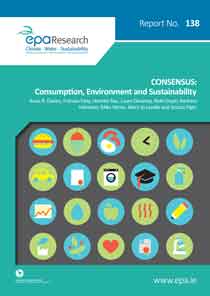Research 138: CONSENSUS: Consumption, Environment and Sustainability
Summary: The CONSENSUS research project conducted foundational and exploratory research to establish the parameters of debates and actions within the field internationally and across Ireland.

‘Sustainable consumption’ is generally conceived as the use of goods and services that respond to basic needs and bring a better quality of life, while minimising the use of natural resources, toxic materials, and emissions of waste and pollutants over the life cycle, so as not to jeopardise the needs of future generations.
It is recognised internationally that achieving sustainable consumption represents a major challenge for public authorities (at all levels), businesses and consumers as it requires economic and social as well as environmental sustainability. In particular, patterns of household consumption are recognised as contributing significantly to global unsustainability yet understanding of that consumption is under-developed in many sectors. In response, the CONSENSUS research project conducted foundational and exploratory research to establish the parameters of debates and actions within the field internationally and across Ireland.
The first phase reviewed existing policy, international good practice and tools for governing sustainable consumption. It was found that Ireland faces a number of key challenges in terms of good governance of sustainable consumption.
These include the lack of a coherent policy framework for sustainable consumption; split responsibility for sustainable consumption across government departments; weakly developed consumer policy; and underdeveloped multistakeholder collaboration in sustainable- consumption discussions.
Recommendations include: the formulation of interventions for sustainable lifestyles from a consumer perspective; more attention to the particularities of the political-institutional context that influences an area of consumption; awareness- raising among consumers of the material consequences of consumption; the combining of regulatory instruments; and the development of tailor-made policy strategies to address the challenge of sustainable consumption.
A review of existing policy, good practice and tools for governing sustainable consumption at international and national scales and a Lifestyle Survey formed the basis of the CONSENSUS research (see Sections 2–3 of this report). Involving 1,500 consumers across Ireland, the survey aimed to uncover people’s attitudes and behaviours towards sustainable household consumption and revealed a persistent value-action gap between reported environmental concerns and sustainable behaviours in practice.
Following the foundational phase of research presented by the Lifestyle Survey, the exploratory phase of CONSENSUS (detailed in Sections 4–7) focused on four challenging areas of household consumption: (i) transport, (ii) energy, (iii) water and (iv) food.
Specific policy recommendations include: the development of a more nuanced understanding of mobility practices and a recognition of the need to work with people’s existing habits and practices; the identification and promotion of ‘niche’ sustainable mobility practices such as informal car-sharing; and appropriate training, legislation and regulation to protect the interests of both employers and employees in workplace-based sustainable mobility initiatives, such as teleworking schemes.
It is clear that the consumption of distance varies across an individual’s life course and further research is required to identify critical moments, or ‘mobility milestones’, when mobility practices evolve.
Reframing of problem arenas also took place in the water, energy and food research with a focus on the heating, washing and eating practices that householders undertake on a daily basis. The application of the novel practice-oriented participatory (POP) backcasting approach generated proposals for regulatory, socio-cultural and technical innovations that might coalesce to work towards the goal of more sustainable household consumption across these three practices. The POP backcasting process resulted in the development of discrete outputs in the form of scenarios and Transition Frameworks, and also served as an important learning tool for those who participated. Coordinating across the diverse set of actors that shape consumption practices is, however, a considerable challenge. This is particularly the case under conditions of economic globalisation where there is little control over the diffusion of new, potentially environmentally damaging products, alongside a preference for non-interventionist governing strategies.
Involving researchers from both Trinity College Dublin (TCD) and the National University of Ireland, Galway (NUIG), the CONSENSUS research project has surpassed its original aims and objectives. It has advanced understanding of the drivers that shape everyday household consumption practices, while also identifying a range of regulatory, technological and lifestyle interventions that could facilitate more sustainable living in the future. In doing so, the project has engaged over 100,000 members of the public along with 100 government, private sector and civil society stakeholders. Extensive results dissemination, project publications, creative online resources and social media activities have ensured that the research findings have attained an international profile.
Associated documentation can be viewed by following this link to our SAFER Database
https://www.epa.ie/media/epa-2020/publications/research/138-front[1].jpg